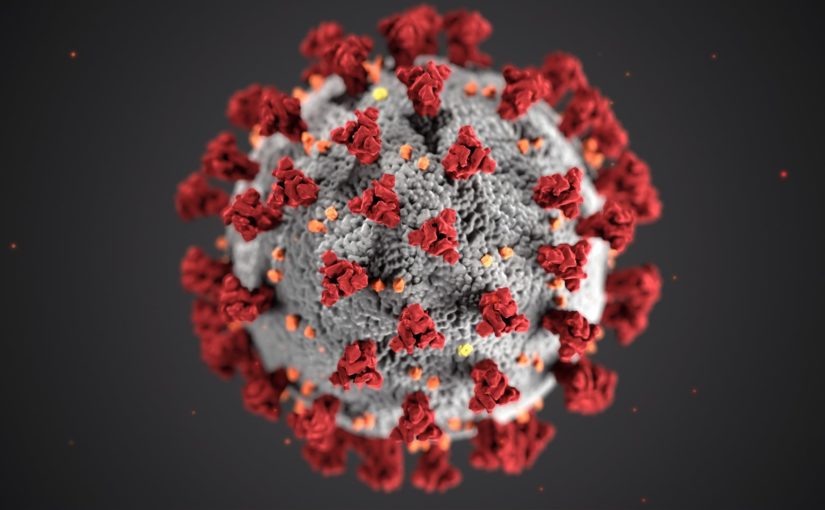Governments across Africa have taken measures to contain the outbreak of COVID-19. The current flood of information is mainly dominated by official sources, media and expert opinions. But how do Africans see the current situation? What do they know about the coronavirus and how are their lives affected? As the KFIBS Africa Research Unit, we were curious to hear the personal stories. This series of blog entries presents answers from people from different countries to questions about personal changes in life, political reactions and their sources of information. We would like to thank everyone who contributed to these articles.
* * *
It has been more than three months now that the world seems to have completely shut down. This is also true for many African countries, such as Kenya, where the government took measures after the first COVID-19 case was confirmed on 12th March 2020. Based on the idea of physical distancing, these measures include the closure of schools and universities, prohibiting all types of public gathering, a nation-wide curfew from 7:00 pm to 5:00 am, containment in several urban areas, travel restrictions, encouraging working from home and imposing hygiene measures.
While the measures taken by the Kenyan government do not seem to differ much from those European governments have implemented, the economic crisis that followed hit the country particularly hard. It put especially vulnerable and poor households, who often fully depend on self-employment and informal wage, on the edge of survival.
COVID-19 and the Challenges for Kenya’s Informal Sector
The informal sector is a section of the economy that englobes jobs which are not recognized as normal income sources and on which income taxes are not paid. Around 80% of the active population in Kenya works in the informal sector which is often characterized by little or no job security, no pension, insurance or health insurance scheme, as well as low wages and the difficulty to make savings. Without any safety net, informal workers are therefore extremely vulnerable to economic crises and human rights violations.
While many informal workers have lost their jobs, as working from home is particularly difficult for those who work in fields where their physical labour is needed outside the household, those who continue to work outside also face great challenges. For example, travel restrictions for public transportation have led to longer travels when workers have to cover the distance from their home to their workplace by foot, making it difficult for some to respect the curfew. Caretakers, mostly women, who have taken their children to informal day care facilities during the day before, are now struggling to organize for childcare, as the centres have closed down. Many informal workers also lack masks and hand sanitizer, and thus risk an infection with COVID-19 themselves while not having a health insurance.
Workers of the informal sector, who own a private business, are also affected: as others have lost their source of income, demand in many sectors is decreasing. At the same time, due to the closure of borders with neighbouring countries, supply chains have been interrupted, resulting in an increase for the price of certain goods.
Even though the Kenyan government has announced a number of fiscal and social insurance measures to cushion the economic impact of the coronavirus, the informal sector will most probably not benefit from these directly. Kenyan informal workers are thus in need of alternative solutions and depend on initiatives of local solidarity.
A New Wave of Kenyan Solidarity
Sometimes great difficulties lead to great initiatives – such as in Kibera, one of Nairobi’s biggest slums, where many inhabitants work in the informal sector. Here, community members walk around weekly, loaded with food baskets and essentials such as soap or washing powder for those in need. In order to finance the products that the volunteers distribute, the organizers of the initiative went online. They started a Facebook group and a GoFundMe campaign in order to raise enough money to buy the much needed food supplies. As of today, they have already raised more than 15.000$ and were able to provide more than 500 food baskets to families in March and April 2020. But also other initiatives in Kibera are trying to help out. There are a lot of small business owners that are trying to give the little they have to the ones that are in need. For example, Chrisantus Oyiera, a young food business entrepreneur, just started his business before COVID-19. Now he is helping out about 20 people on a regular basis:
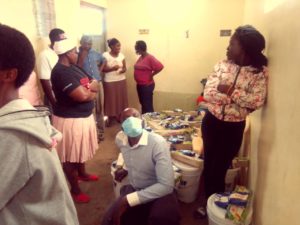 “I always feel that humanity comes above everything else. It hurts when the Kenyan government shuts down clubs, hotels and other major businesses and leaves millions of the Kenyans jobless and hopeless without food. I just can’t sleep nor eat while someone starves within my watch. That’s why I try to feed those I can reach out for.”
“I always feel that humanity comes above everything else. It hurts when the Kenyan government shuts down clubs, hotels and other major businesses and leaves millions of the Kenyans jobless and hopeless without food. I just can’t sleep nor eat while someone starves within my watch. That’s why I try to feed those I can reach out for.”
(Chrisantus Oyiera, Nairobi, Kenya)
The “Karen Crusaders Touch Rugby”, a Kenyan group of rugby players, also founded an initiative called “Strengthening the Vulnerable” in order to feed the most vulnerable in Nairobi, that is street families, pregnant women, children, elderly and homeless people in general. Having started out with a group of 30 people, they now reach up to 170 people in need per day and have already supported more than 1800 people with food. Due to a national curfew from 7:00 pm to 5:00 am some families that live on the streets cannot access town, where they normally buy food. The team meets up daily in Lang’ata to cook and deliver the food.
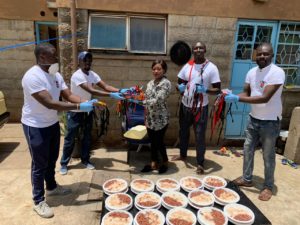 “I have always wanted to make a change in this world but lacked capacity, or so I thought until I came across the phrase ‘extraordinary things are done by ordinary people who have vision, passion and determination’. I stopped making excuses and started with what I had at my disposal and now we are here with a capacity to feed over 500 people and more per day. Everyone is infected or affected in one way or the other: We are just trying to bridge the gap, we are just trying to strengthen the vulnerable.”
“I have always wanted to make a change in this world but lacked capacity, or so I thought until I came across the phrase ‘extraordinary things are done by ordinary people who have vision, passion and determination’. I stopped making excuses and started with what I had at my disposal and now we are here with a capacity to feed over 500 people and more per day. Everyone is infected or affected in one way or the other: We are just trying to bridge the gap, we are just trying to strengthen the vulnerable.”
(Victor Andanje, Nairobi, Kenya)
The rugby players and their team do not only donate food, but also much needed facemasks, clothes, shoes, blankets and sanitary towels financed by themselves, families and friends. After weeks of hard work, they are now even cooperating with Kenya’s official COVID-19 Emergency Response Team, an arm of the government.
The founders of Yoga Heart Kenya, who run a yoga studio in Nairobi and grew up in the slum of Kangemi (Nairobi), have now turned their attention to supporting communities in the two slums of Kangemi and Kibagare. Their support reaches from installing handwashing stations to the distribution of basic food necessities. They also give yoga classes to fundraise for their campaigns.
While many Kenyans, who work in the informal sector, lost their jobs, others continue to work – such as many security guards in the country’s capital. Because shifts often stretch from the early morning hours until the evening, and the government imposed a strict curfew between 7:00 pm and 5:00 am, many of them cannot reach a supermarket before it closes and thus have to go home to their families empty-handed. Therefore, some neighbourhoods in which the guards work have decided to collect money and do the grocery shopping for them.
“Nick has been keeping our houses safe for the past years, now it’s our time to give back and make sure his family is save even during the current crisis”, one of the neighbours, who supports their guards, explains.
Altering the Image of the Poor
Kenya is often portrayed as a country depending on foreign aid and investments. However, the current global crisis has resulted in a variety of new solidary acts initiated by Kenyans for Kenyans. Although this is not a particularly new trend, and many Kenyans have always supported others, COVID-19 has motivated people who have not done so before to help out and support others on the one hand, and led to new initiatives on the other hand. While this seems to be a global trend, and we were able to observe similar patterns in other countries, we find it particularly important to also hear about solidarity initiatives from Sub-Saharan Africa. We believe that sharing encouraging news from communities and places that are usually reduced to their vulnerability in European media during such troubling times, may alter the image of the “helpless poor” and show another reality of solidarity, self-empowerment and innovation.
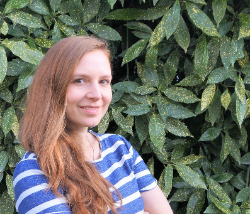
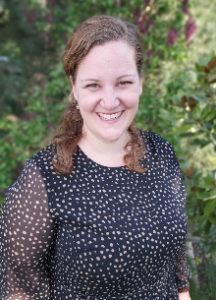
This article was written by Samantha Ruppel and Alena Sander.
(Hinweis: Der vorliegende Blog-Beitrag gibt nicht zwingend die Meinung des KFIBS e. V. wieder.)

